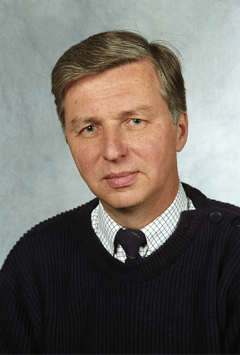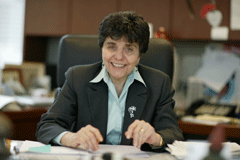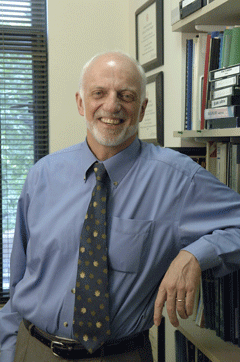Conflicting Interests
Air Date: Week of December 1, 2006

Dr. Lennart Hardell works in the Department of Oncology at the Örebro Medical Centre, in Örebro, Sweden (Courtesy of Dr. Lennart Hardell)
A new study finds a number of the world’s leading cancer scientists were secretly receiving money from companies whose products they were investigating. Living on Earth host Bruce Gellerman talks with Dr. Lennart Hardell, principle author of “Secret Ties to Industry and Conflicting Interests in Cancer Research.” LOE then turns to Dr. Catherine DeAngelis, editor-in-chief of the Journal of the American Medical Association, and epidemiologist Richard Clapp of Boston University to discuss conflict of interest and corporate funding of medical research.
Transcript
GELLERMAN: From the Jennifer and Ted Stanley Studios in Somerville, Massachusetts - this is Living on Earth. I’m Bruce Gellerman. A new study charges some of the world’s most prestigious cancer researchers were secretly receiving money from major chemical corporations. The allegations of conflict of interest appear in the latest edition of the American Journal of Industrial Medicine, and it names names. The lead author of the article is Swedish scientist Lennart Hardell. Professor Hardell, thank you very much for joining us.
HARDELL: Thank you.
GELLERMAN: Now, in your articles you found that some of the world’s leading scientists were secretly on the take from companies that were funding research.

Dr. Lennart Hardell works in the Department of Oncology at the Örebro Medical Centre, in Örebro, Sweden (Courtesy of Dr. Lennart Hardell)
GELLERMAN: Well, in one case that you cite you have Dr. Richard Doll who was the researcher who originally found the link between smoking and cancer and you found that he was on the take from Monsanto for, what, over 20 years.
HARDELL: Yes, and we were quite shocked when we found that because he was a very well reputated cancer researcher who has unfortunately passed away by now.
GELLERMAN: You found that while he was receiving a thousand dollars a day from Monsanto was testifying that vinyl chloride had no consequences in terms of workers who were dealing with vinyl chloride and getting cancer. And yet the link was quite evident.
HARDELL: Yes it was quite evident and also WHO has considered vinyl chloride to be a carcinogenic product and still Sir Richard Doll said there was no problem. So with this background now knowing that he was secretly hired by Monsanto, so that might be one explanation for his standpoint on that special issue.
GELLERMAN: But, basically, what you’re saying is that this was the best science, or scientist, that money could buy.
HARDELL: Yes, unfortunately.
GELLERMAN: The golden rule here applies. You know, that he who has the gold rules.
HARDELL: Yes and this gives a different light on their findings their reports and their work for different governmental agencies.
GELLERMAN: You implicate some of the leading scientific researchers in the world and some of the leading academic science organizations in the world. How could it be?
HARDELL: Well, that’s difficult that you have people in such positions who want to be powerful; who want to have big organizations and do much research and then you need much money. And if you don’t get the money from granting organizations then you have to go to industry because that’s where money is.
GELLERMAN: But if you have these types of professors and researchers people at the height of their game in their fields being able to be persuaded to, well, taint their research for money, who isn’t susceptible?
HARDELL: Well, that’s really a problem. Anyone could be susceptible if there’s enough money on stake. From my point of view it’s quite ok to work for industry but then you should declare because this is a conflict of interest. So, if we see this report on vinyl chloride from Dahl he should have said at the end of the paper that he wrote that, “actually I was paid by Monsanto” there’s a conflict of interest here.
GELLERMAN: So it’s not a problem accepting money but you just have to tell the public that that’s what you’re doing?
HARDELL: Yes. You tell the public what you’re doing and the public can make their own conclusions. And also other researchers can make their conclusions. I’m not saying that it should be forbidden for university researchers to do work for industry but then you should report it to your employer and also report it in your publications, of course.
GELLERMAN: There was a study recently done that shows a third of all the original research published in the New England Journal of Medicine and the Journal of the American Medical Association was funded by for-profit health care companies. That’s not cause for concern then?
HARDELL: Well, it is of concern that this research type is not independent and not all researchers report, obviously, this connection to industry. But this biggest concern is, of course, the reports that show that industry funded research tends to show no risk from the product they are studying. There’s quite a clear difference. I’m doing work on mobile phones and brain tumor risk. And when we look into industry-sponsored studies versus those coming from independent groups there’s quite a difference of the results. Namely, that industry sponsored research tends to show no risk where as other ones show that there is something going on.
GELLERMAN: So, Dr. Hardell, what should be done so that we don’t have these types of horror stories in the future? Can anything really be done?
HARDELL: Well, I’ve been working in cancer epidemiology for 30 years and also seeing the cancer patients on a daily basis and I’m rather pessimistic what we can really do in the future because these are such extremely strong forces and there’s economical power in research. In the best of worlds of course everything should be governmentally funded research or by independent grant funding organizations. But we don’t have that situation, so we have to live and somehow try to sort it out by having pressure on the journals to disclose all of these scientific conflicts and also from the scientists themselves to disclose if there are any such problems.
GELLERMAN: Dr. Hardell, thank you very much. It was a real pleasure talking to you.
HARDELL: Thank you.
GELLERMAN: Professor Lennart Hardell is principle author of the study “Secret Ties to Industry and Conflicting Interests in Cancer Research.” Monsanto was unable to provide a response to our story in time for our broadcast. You can check our website: loe.org for an update.
So, just how big a problem is conflict of interest in medical research? We turn to Boston University epidemiologist Richard Clapp and Dr. Catherine DeAngelis editor –in-chief of the Journal of the American Medical Association. Well, Dr. DeAngelis, the question is to you: how big a problem is it?
DeANGELIS: Huge. I think this is one of the biggest problems in medicine today, because it affects the research, which of course then affects the practice of medicine, which ultimately affects patient care.

Dr. Catherine DeAngelis is the Editor-in-Chief of the Journal of the American Medical Association.
(Courtesy of JAMA)
GELLERMAN: So Dr. DeAngelis, what is the journal of American Medical Association doing about conflict of interest?
DeANGELIS: What we are doing is, first of all, we insist that every author must disclose fully any potential or real conflict of interest. I say to the authors it’s like doing a spinal tap. If you think about doing it you’d better do it. Then it’s up to us to determine whether or not we should publish it. If they don’t disclose it and I discover it I insist that the author writes a letter of apology to our readers.
CLAPP: I would add though that the reviewers sometimes are able to put in their two cents on whether there’s a conflict. The reviewers may know the authors or at least know the content around which the article is built and so that adds to this disclosure as well.

Professor Richard Clapp is an epidemiologist and Professor of Environmental Health at Boston University’s School of Public Health.(Courtesy of Boston University School of Public Health)
DeANGELIS: Absolutely. I think that the vast, vast majority of authors, principle investigators, researchers, reviewers, are completely honest. It is just a very small percentage who really have made this problematic. And the problem is, I think, a much more substantial proportion of clinicians have become involved with either pharmaceutical companies or medical device companies. These are for profit companies, physicians say oh that doesn’t affect my practice. And my response is, “Believe me, if the pharmaceutical company didn’t think it affected your practice they wouldn’t be spending literally hundreds of millions of dollars on paying for these little perks, if you will.” I think it’s ridiculous.
GELLERMAN: Yeah but so far, Dr. DeAngelis, what I hear is kind of physicians and physicians magazine heal thy selves. I don’t hear anybody from the outside doing anything. That is, getting tough on the drug companies.
DeANGELIS: Well, ah, stay tuned.
CLAPP: There have been suggestions that there be a national institute for clinical trials for this kinda thing so that it’s actually government funded research on new drugs and new devices.
GELLERMAN: So companies would pay the government and the government would fund the studies.
CLAPP: Yes or put their money into a fund, a pool and, and not exactly pay the government to fund a particular study.
GELLERMAN: Did you ever have a company try to influence your research?
CLAPP: Never had a company try to influence the research. I have had companies, you know, extremely upset, upset with the results of my research and try and prevent it from being published.
GELLERMAN: Were they ever successful?
CLAPP: Nope.
GELLERMAN: So, the system works?
CLAPP: In some sense. It’s a battle. I wouldn’t say it’s an easy walk to freedom so to speak. It can be made to work but I think you have to be determined if you’re the researcher and you have to be vigilant if your the watchdog.
GELLERMAN: But, but I’m reminded that the former head of the Food and Drug Administration, Lester Crawford, just pleaded guilty 2 months ago to failing to disclose his financial interest in health care companies that were governed by his agency.
DeANGELIS: Big surprise. Were you surprised by that?
CLAPP: I wasn’t.
DeANGELIS: I mean come on. I mean as long we tolerate and do not clamp down on people who are doing this, which is blatantly dishonest, it’s going to continue.
GELLERMAN: So what about your journal? I leaf through it and I see, you know, one third is articles and two thirds ads for drug companies.
DeANGELIS: Ok. Let me tell you about that. If it were up to me I would not allow any ads in our journal. However, it costs a lot of money to do what we do and putting out a journal like that. And so the one thing we do is we separate the advertising. That’s all done by the publisher. We have the strictest rules for advertising. One of our rules is you can never sell an ad to a specific issue. That happened while, during my first six months here and I got a call from the advertising group that sells and they said Dr D., this company wants to advertise this four-page ad. And I said wait a minute, and they said, cause it’s in one issue and I said wait a minute, we don’t do that. And they said no, no. They want it in that issue. So I looked at the issue. We work five six weeks ahead. Sure enough there was an article in there for a product by this company. And I thought about it for a minute and I said alright, we’ll take it. And they said really? I said sure. It was a big ad. And then I moved the article ahead two weeks.
CLAPP: Another approach is online and or what’s called open access journals where the, the person who’s submitting the article actually has to pay for it to be put online and, and actually pays for the peer review process.
DeANGELIS: Sure, but let me tell you what’s wrong with that. It’s unfair to those authors who don’t have money to pay for their article to go online. That is very poor practice.
CLAPP: Well, it’s a widely accepted and growing practice.
DeANGELIS: I know, I know. So is cancer. It’s widely growing and it’s, sometimes I look at it as the same effect. This is, this is a terrible issue and it’s something that we can do something about but we all have to do it together.
GELLERMAN: Dr. De Angelis I want to thank you very much.
DeANGELIS: Thank you so much.
GELLERMAN: Dr. Catherine DeAngelis is editor-in- chief of the Journal of the American Medical Association. Dr. Clapp, thank you very much.
CLAPP: You’re welcome.
GELLERMAN: Richard Clapp is an epidemiologist at Boston University.
Links
The Journal of the American Medical Association
Living on Earth wants to hear from you!
Living on Earth
62 Calef Highway, Suite 212
Lee, NH 03861
Telephone: 617-287-4121
E-mail: comments@loe.org
Newsletter [Click here]
Donate to Living on Earth!
Living on Earth is an independent media program and relies entirely on contributions from listeners and institutions supporting public service. Please donate now to preserve an independent environmental voice.
NewsletterLiving on Earth offers a weekly delivery of the show's rundown to your mailbox. Sign up for our newsletter today!
 Sailors For The Sea: Be the change you want to sea.
Sailors For The Sea: Be the change you want to sea.
 The Grantham Foundation for the Protection of the Environment: Committed to protecting and improving the health of the global environment.
The Grantham Foundation for the Protection of the Environment: Committed to protecting and improving the health of the global environment.
 Contribute to Living on Earth and receive, as our gift to you, an archival print of one of Mark Seth Lender's extraordinary wildlife photographs. Follow the link to see Mark's current collection of photographs.
Contribute to Living on Earth and receive, as our gift to you, an archival print of one of Mark Seth Lender's extraordinary wildlife photographs. Follow the link to see Mark's current collection of photographs.
 Buy a signed copy of Mark Seth Lender's book Smeagull the Seagull & support Living on Earth
Buy a signed copy of Mark Seth Lender's book Smeagull the Seagull & support Living on Earth

